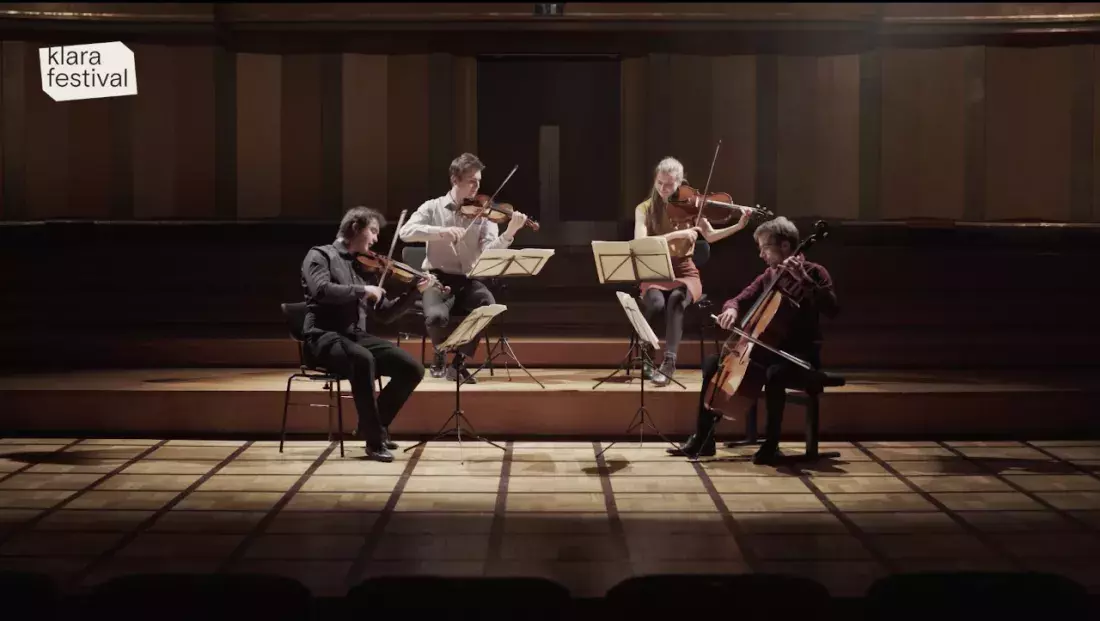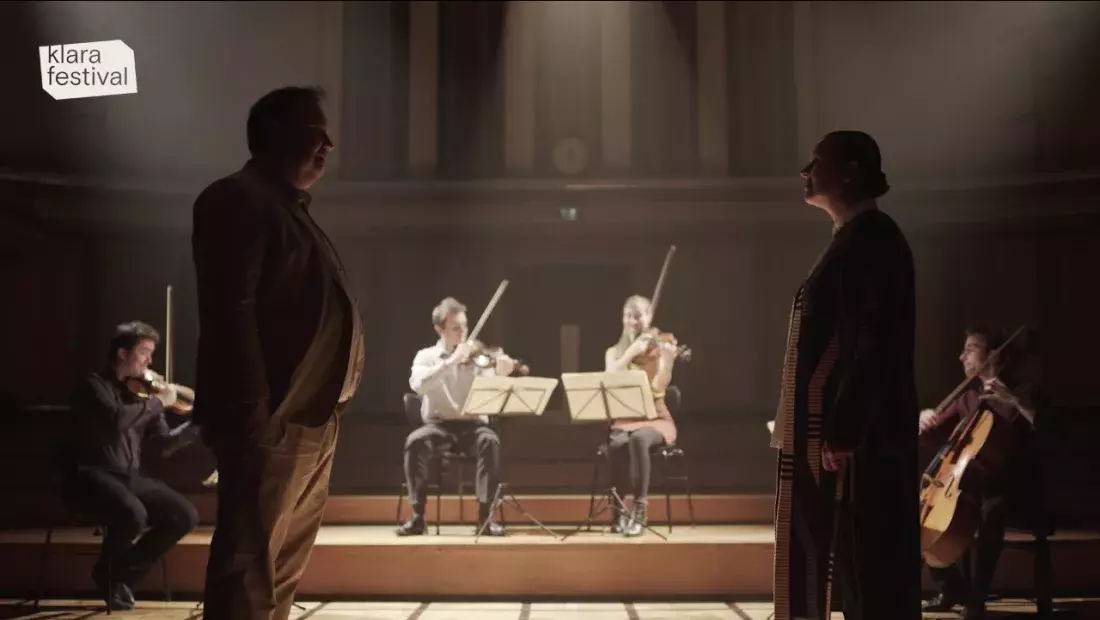es ist noch nicht alles verloren
The sign above the Lost Property office at Wuppertal station proclaims: “es ist noch nicht alles verloren!” (“All is not lost!”) With this phrase in mind, Klarafestival 2021 has slowly but surely taken form. It is a response to the pandemic that is currently gripping the world. Because of this, Klarafestival 2021 will be a digital festival featuring 12 different audiovisual projects: familiar classics, forgotten gems and a good number of new pieces to offer hope and comfort. We’re also looking ahead. Can we maintain the same relationship with our environment in the post-coronavirus era? What can, and must, be done differently? Discover more from 13 until 22 March here on our website.
The previous edition of Klarafestival, reduced to a single day, was the starting point for a period of intense change. Our self-image, formed during the Enlightenment – that the human is a rational being, distinct from the rest of nature, privileged and free – took a severe knock. We were sent back into nature as an organism that is sensitive to environmental factors, totally dependent and inextricably connected with the great network of nature. Bad news for human vanity, as the German author Philipp Blom described the corona pandemic. But it could also be a shared experience, a communal resonance chamber that could form the breeding ground for a new way of behaving.
The crisis as an opportunity
“Only a crisis – actual or perceived – produces real change,” was the adage of the American economist Milton Friedman. And it was true: for many, the first weeks of lockdown were a welcome break, a time to take stock, reflect, and question the lives that they were living. In many cases, this period of reorientation resulted in significant life choices being made.
Klarafestival also underwent a period of intense reflection. In which direction do we want to be heading over the coming years? How do we ensure that both the musicians on the stage and the audience in the hall represent our society better? Which projects do we want to undertake to put ourselves on the map? And, perhaps most importantly of all: what can we do for those people who don’t have the luxury of being able to reflect, but have to fight for their very survival?
a changing society
However, Friedman’s quote does not relate solely to individuals and organisations, but society as a whole. Recent history offers plenty of examples of moments of crisis leading to drastic social reforms.
In her book The Shock Doctrine, the Canadian philosopher, activist and publicist Naomi Klein examines how Margaret Thatcher only gained support for her neoliberal programme after winning the Falklands War; how the attacks on the twin towers led to the present American security state; and how the development of the Sri Lankan coastline into a tourist paradise only really got going after the tsunami in 2004 – when local fishermen were forced to rebuild their homes further inland.
The democratic vacuum that usually arises after a serious crisis is all too often exploited to push through agendas that are sensitive to public opinion, according to Naomi Klein’s analysis. In her view, we should be wary today of a further shrinking of the public domain, the fragmentation of our welfare state and a ‘no-touch’ future, which will be extremely profitable for only a couple of companies.
It is the responsibility of citizens to ensure that these crises do not catapult us backwards but forwards. Cultural events like Klarafestival can contribute significantly to the public debate: raising voices that would not otherwise be heard, adding to the cultural debate with sensory experiences, and reminding ourselves through the nurturing and ongoing development of our artistic heritage that the emotions we are experiencing now have been felt before.
Dealing with both the coronavirus crisis and the climate crisis
“Es ist noch nicht alles verloren” – relates not only to the current health crisis, but also to the climate crisis that we are experiencing today. A renewed focus on and care for our habitat is an essential part of a sustainable society. Music can reconnect us with nature. After all, compositions are often nothing more than the record of an observation of nature, an attempt to capture the rising of the sun in sound, or a musical translation of the sound of the wind.
While preparing for Klarafestival 2021, the word ‘connect’ came to mind, as we as people are ultimately all in the same boat, and only collective efforts can provide a solution to the coronavirus and climate crises. Sharing our experiences, whether or not they are sublimated in music or literature, can have a cathartic effect, offer hope, and maybe even solutions. A second word that came up over time, based on the observation that we are capable of huge collective efforts and that the human being is an incredibly creative creature, is ‘resilience’. After all, unlike animals, people are able to organise themselves in order to deal with the most difficult problems.
Natural idyll
Klarafestival 2021 opens with Songs of Nature, a production by B’Rock and Muziektheater Transparant. In the eighteenth century, people started to look at nature through a very different lens. Handel’s Neun deutsche Arien, performed by soprano Ilse Eerens, bear witness to this. Songs of Nature analyses the early Romantic roots of climate awareness.
Nearly two centuries later, the Romantic era culminated in the work of Gustav Mahler, a composer who drew inspiration from nature more than any other. The numerous composing huts he had built in Austria are echoes of Thoreau’s hut on Walden Pond. The Brussels ensemble Het Collectief performs Mahler’s Das Lied von der Erde in an arrangement by the recently-deceased pianist, conductor and composer Reinbert de Leeuw.
The Romantic country idyll was not to last. The Antwerp Symphony Orchestra conducted by Edo de Waart juxtaposes Wagner’s Siegfried-Idyll – in which birds chirp as the sun gently rises – with Richard Strauss’ Metamorphosen. This composition for 23 string instruments, a lament written around the end of the Second World War, heralded the dawning of a new era.
Ictus and the Brussels Philharmonic string section perform several minimalist masterpieces that show a very different side to nature. Charles Ives’ The Unanswered Question introduces us to the unending nature of the universe, while Gavin Bryars takes us down into the depths of the ocean in The Sinking of the Titanic.

New talent
How must we go on, after the sinking of the Titanic and the downfall of Romance? Young talent leads the way. At Klarafestival’s request, the instrumentalists of Berlin’s STEGREIF.orchester put their ears to the ground in a number of European countries and wrote down stories which then formed the basis for new compositions. An idiosyncratic version of Beethoven’s Ode to Joy, hummed wordlessly, finally draws everything together. Prior to this unique concert – live from Berlin – Juri De Marco, artistic director of the STEGREIF.orchester, holds a discussion with a group of EU interns.
Alongside the European presence, the face of Brussels is defined largely by the people of the city themselves. Five Molenbeek organisations, in partnership with Klarafestival, BOZAR and the Municipality of Molenbeek have worked with local talent to develop artistic programmes together. The MUSIKAA project is the first step towards an inclusive, sustainable and inspiring story. Discover the results online or by scanning QR codes on a walking route through Molenbeek!
Young talent can also be heard at the SUPERNOVA winner’s concert. The Desguin Kwartet from Antwerp rediscovered Peter Benoit’s only string quartet. Trio Aries performs Schönberg‘s Verklärte Nacht in an arrangement by Eduard Steuermann.
Gesualdo and Piazzolla
It’s the aim of Klarafestival to provide comfort and hope. Two composers who wrote exceptionally moving music can help with that: Carlo Gesualdo and Astor Piazzolla (who was born exactly a hundred years ago in March 2021). The Collegium Vocale Gent tackles Gesualdo’s Fifth Book of Madrigals under the direction of Philippe Herreweghe in Flagey. In BOZAR, SONICO and the Orquesta Tanguedia pay tribute to Astor Piazzolla, the grandmaster of the tango. Italian renaissance music and Argentinian joie de vivre help take our minds off the present, just for a moment.

Creations
How do artists respond to the world we live in today? In recent months, Klarafestival has commissioned a large number of artists to create new work. Sound & Vision compiles the results of seven duos - each comprising a composer and a visual artist - who have each created their own audiovisual project. Anouk De Clercq, Frederik Croene, Wim Hendrickx and Eva-Maria Houben are just some of the names on the programme.
De oude woorden… brings Klarafestival 2021 to a close. In partnership with the Passa Porta Festival, we invited Dutch author Ilja Leonard Pfeijffer (author of Grand Hotel Europa and more) to write a new idyll. As a resident of Genoa, he had a front-row seat at the start of the pandemic in Europe. Based on Pfeijffer’s long narrative poem, Frederik Neyrinck has written a piece that will be performed by several players from I SOLISTI with soprano Lore Binon and actor Josse De Pauw.
Context
A lot of additional information on these digital performances will appear over the coming weeks on the Klarafestival website, in the form of a festival programme. What can you expect? Interviews, podcasts and a video series looking at how artists have brought ‘es ist noch nicht alles verloren’ to fruition.
In partnership with Muntpunt, Klarafestival has also organised a discussion around the central issue of what personal engagement can mean in times of crisis. Composer Saskia Venegas Aernouts, climate scientist and UC Louvain Professor Jean-Pascal van Ypersele and Eka van Beeren, an active member of the radical environmental movement Extinction Rebellion, will get together to discuss this. The talk will be preceded by the performance of a composition by Saskia Venegas Aernouts.
Keep an eye on our website and social media for updates! Together with you, we look forward to what promises to be a unique edition of Klarafestival.